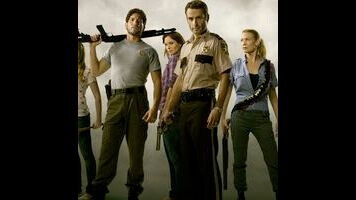The Walking Dead: “What Happened And What’s Going On”

The Walking Dead has definitely gotten artier. Even at its worst, this was rarely an artless show; even when the writing was slack and the characters looped around each other like yo-yos in zero gravity, there was still a consistently impressive look and feel to the thing, a sweaty, nervy vitality that helped make the rough spots more endurable. And that feeling has only grown more intense over time. “What Happened And What’s Going On” starts with a disorienting cold open, with a sequence of seemingly random images—digging in the dirt, a framed picture of a house, photographs, spilling blood. These images are contextualized later in the hour, but the disorientation never entirely goes away. Taken on style alone, this is a haunting, frequently mesmerizing hour of television.
Ah, but then you put the script back in, and things get tricky.
It’s not that “What Happened And What’s Going On” is badly written. At worst, it’s perfunctory, with characters once again reduced to delivering as text what any other show might have tried to reveal through subtext. (And really, it’s hard to blame the writers for this; I imagine the zombie apocalypse would teach survivors quick, painful lessons in how to communicate without bullshit.) And there’s an impressive amount of trust placed on the audience’s shoulders. When we last left our heroes, Beth had been brutally killed, and everyone was sad. When we pick up with things again, we find that the group has decided to visit a new potential safe location, going on a tip from Noah. He’s from a gated community in Richmond and, at least according to him, things are still secure there. That’s where he and Beth were planning on going when they escaped.
This information is given to us relatively straightforwardly, but it’s still happens quicker, and with less discussion, than we’re used to. And that’s a good thing. By now, the standard routine of coming up with a new destination, fighting your way there, and then realizing everything’s gone to shit, is so familiar that it barely needs the details. So skipping most of the steps makes sense. This isn’t a story that’s supposed to be particularly suspenseful, anyway, or at least, it’s not suspenseful in the way we’d expect it to be suspenseful. You don’t really believe Noah’s home will be okay. Nobody’s home is okay. Not anymore.
There’s a conversation that shows how Rick, Michonne, and Glenn are dealing with Beth’s death. (The short answer: not great.) But the real meat of the hour comes when Tyreese follows a distraught Noah home, and gets himself bitten by a zombie while he’s admiring Noah’s family photos. As Tyreese slowly bleeds out on the floor, he has a vision of various other people (now dead) whom he’s known over the course of the series. Some of them are accusatory; some of them tell him his life will be better once he just let’s go. There’s a monologue Tyreese gives earlier about having to keep up with the news as part of the cost of being in the world (something his father taught him), and it all ties back to Tyreese feeling guilt over not being able to kill, but I have a hard time caring because all I’m really thinking is this? Again? We have to go through this again.
Look, I get it. I get that this show needs to burn through some of its characters from time to time, because that’s how this thing works, and a zombie apocalypse without a body count wouldn’t be much of a zombie apocalypse. And to their credit, the writers do make an effort to distinguish this death from Beth’s violent conclusion. Tyreese doesn’t exactly go out peacefully (Rick and the others chop off his bitten arm in a doomed attempt to save him), but the tone throughout is more elegiac than scarifying. Which is kind of horrifying in its own way, really. This is an episode about a good man deciding to die, because death is, ultimately, a hell of a lot easier than living. I’m not sure it’s entirely justified, but people aren’t always thinking clearly after they’ve been bitten by monsters, and besides, Tyreese was on the edge of becoming a problem character. As noble as his refusal to kill was, it didn’t really suggest much in the way of interesting stories; there are only so many times someone can show mercy, and then be punished for it, before the plot goes stale.
Still this is a major bummer, especially coming so soon on the heel’s of Beth’s demise. Done well, a character death can provide a major push forward for a series, throwing off a potentially tired status quo and driving characters to act in unexpected (and often shocking) ways. But two deaths like this, one on top of the other, and it’s hard to keep invested in what happens next. Everything just goes numb, and the thought of watching the people left alive struggle to move on doesn’t offer much in the way of thrills. Michonne suggests a possible way forward: to head to Washington, D.C., even if Eugene (who’s still alive) was lying about having a cure. It’s something, anyway. But as artful as this episode often was, the art couldn’t hide the basic emptiness lurking at the inside of all of this. This is a show where a character hallucinates the ghosts of his past, and those ghosts tell him dying is better—where, given the context, it was almost impossible to find any reason to argue with them.
Stray observations:
- “You’re the kind of guy who saves babies.” God forbid, can’t have any of those around.
- Hey, the Governor’s back! It’s okay, he’s not actually real.
- Seriously, is next week just going to be everyone crying all the time, because that’s where it feels like this is headed.